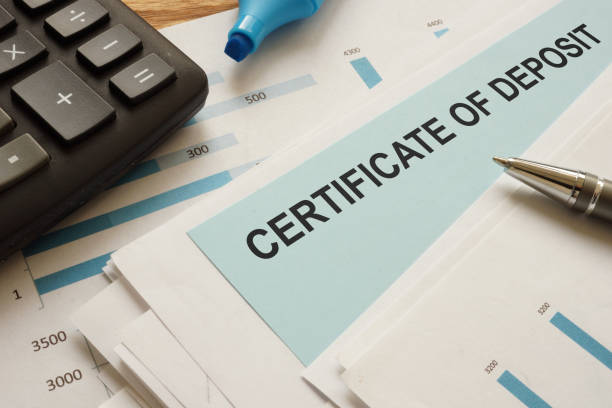This article may contain references to products or services from one or more of our advertisers or partners. We may receive compensation when you click on links to those products or services. Nonetheless, our opinions are our own.
The information presented in this article is accurate to the best of our knowledge at the time of publication. However, information is subject to change, and no guarantees are made about the continued accuracy or completeness of this content after its publication date.
Businesses need to be smart about how they handle their cash reserves in today’s unstable financial world. Investing in Certificates of Deposit (CDs) is a popular choice among smart business owners. Business CDs are a safe and low-risk way to grow extra cash. They guarantee returns while keeping your capital safe. They are a good choice instead of regular savings accounts and riskier investments because they have good interest rates and flexible terms. We’ll discuss the pros of business CDs, compare the best rates, and give you tips on maximizing this investment, like laddering and tax management. Understanding how to use business CDs can help your company get stronger financially, whether you need short-term cash flow or want to maximize long-term growth.
- Why Business Owners Are Choosing Certificates of Deposit for Higher Returns
- CD Terms
- Comparing Interest Rates
- The Benefits of Laddering Business CDs
- Tax Implications on Business CDs
- Choosing Between Traditional and Jumbo CDs
- Online Banks vs. Traditional Banks
- Breaking Down Early Withdrawal Penalties
- Strategies for Renewing Your Business CDs
- Fixed vs. Variable Rate Business CDs
- Economic Indicators That Influence CD Rates
- Final Thoughts
- Frequently Asked Questions
- Recommended Reads
Why Business Owners Are Choosing Certificates of Deposit for Higher Returns
More and more business owners are choosing high-yield business Certificates of Deposit (CDs) to make the most of their cash reserves. These CDs usually have much higher interest rates than regular savings accounts, which means that businesses can make more money on their extra cash. This investment option is very appealing because it offers a safe place to keep extra cash while also making returns that can beat inflation.
Advantages include:
- Guaranteed returns: The fixed interest rate ensures predictable gains over the term of the deposit.
- No market risk: Unlike stocks and other volatile investments, your principal remains secure with a CD.
- Diverse terms: Business CDs can last anywhere from a few months to several years, giving you the freedom to choose the length that works best for your cash flow needs.
- Simplicity: Opening and managing a CD account requires minimal effort compared to more complex investment strategies.
This approach not only protects capital but also enhances financial growth potential, making it an attractive option for business leaders focused on improving their financial position.
CD Terms
How different terms can change your interest rate, and why it’s important for your business strategy to pick the right length
When evaluating CDs for your business, it is essential to understand how the length of the term impacts the interest rate. Typically, longer terms offer higher rates because banks value the stability of long-term deposits.
- Short-term CDs (3 months to 1 year): Lower yields but more liquidity—ideal for businesses with fluctuating cash flow needs.
- Medium-term CDs (1 to 3 years): A balance between return and access, often providing better rates than short-term CDs.
- Long-term CDs (over 3 years): Highest rates, but your funds are locked in, offering less flexibility if unexpected needs arise.
Consider your business’s short-term liquidity needs and long-term financial objectives before committing to a specific CD term.
Comparing Interest Rates
A breakdown of top financial institutions offering competitive business CD rates
It is vital to understand the current CD rates across institutions. Here are some standout options:
- Bank A: A 1-year CD with a 2.50% APY is great for short-term plans.
- Credit Union B: 3-year CD with 3.10% APY gives better returns with a moderate commitment.
- Online Bank C: Businesses that are willing to lock in long-term gains can use a 5-year CD with a 2.75% APY.
In addition to APYs, compare minimum deposit requirements and early withdrawal penalties. Each bank offers unique terms that may suit different business strategies.
The Benefits of Laddering Business CDs
How creating a CD ladder provides liquidity while maximizing interest earnings
Laddering involves splitting your investment across CDs with different maturity dates. This approach offers:
- Increased liquidity: Funds become available at regular intervals.
- Maximized earnings: Longer CDs in the ladder typically yield better rates.
- Risk diversification: Spreading your money across terms helps mitigate interest rate volatility.
A CD ladder helps maintain flexibility while securing stronger returns over time.
Tax Implications on Business CDs
How interest is taxed and ways to lower your tax bill
Interest earned from CDs is taxable business income. You must report this income using the appropriate tax form for your business structure (e.g., Schedule C for sole proprietors, Form 1120 for corporations).
Strategies to manage taxes:
- Time your income: Align CD maturities with lower-income years to reduce the tax impact.
- Diversify accounts: Use tax-advantaged options like IRAs or municipal bonds alongside CDs.
- Claim deductions: Ensure all business expenses are deducted before calculating taxable income.
Proactive tax planning can help maximize returns from CD investments.
Voted "Best Overall Budgeting App" by Forbes and WSJ
Monarch Money helps you budget, track spending, set goals, and plan your financial future—all in one app.
Get 50% OFF your first year with code MONARCHVIP
Choosing Between Traditional and Jumbo CDs
Understand the differences in deposit requirements and benefits of larger investments
- Traditional CDs: Require lower deposits ($1,000–$10,000). These are accessible for most businesses but may offer lower rates.
- Jumbo CDs: Require $100,000+ deposits but provide:
Higher interest rates
Longer-term investment options
Reduced sensitivity to short-term market fluctuations
Select the option that best aligns with your liquidity and yield preferences.
Online Banks vs. Traditional Banks
Where to get the best business CD rates
- Online banks: Higher interest rates, fewer fees, but limited customer service.
- Traditional banks: Lower rates but offer in-person service and bundled banking solutions.
Compare the following:
- APYs
- Fees and minimum balances
- Access to customer service
- Digital banking capabilities
Choose based on your business’s preference for convenience versus personal interaction.
Breaking Down Early Withdrawal Penalties
What to consider before committing to a CD
Early withdrawals typically incur penalties such as:
- Loss of 3 – 6 months’ worth of interest
- Larger fees for longer-term CDs
Tips:
- Choose shorter terms if you anticipate needing liquidity.
- Maintain separate emergency funds.
- Explore “no-penalty” CDs (with lower rates) if flexibility is a priority.
Being informed prevents surprises and helps preserve your earnings.
Strategies for Renewing Your Business CDs
Manage maturity dates and seize reinvestment opportunities
- Stagger maturities: Create a ladder to spread out access to funds.
- Monitor rates: Reinvest when market conditions favor higher yields.
- Diversify holdings: Blend CDs with other low-risk instruments.
- Stay agile: Have a reinvestment plan to adapt to economic changes.
Proactive renewal planning ensures continuous growth and liquidity.
Fixed vs. Variable Rate Business CDs
Choose between stability and flexibility based on how much risk you can handle.
- Fixed-rate CDs: Offer guaranteed interest for the term—ideal for predictable income and stable planning.
- Variable-rate CDs: Rates fluctuate with market trends—potential for higher returns but with added risk.
Use fixed CDs for certainty; use variable CDs when you expect rising interest rates and can accept short-term volatility.
Economic Indicators That Influence CD Rates
What to watch when planning your investments
- Federal Reserve interest rates
- Inflation trends
- Economic growth data (GDP)
- Unemployment rates
- Consumer sentiment and demand for credit
Tracking these indicators helps you time your CD investments and maximize returns.
Final Thoughts
Putting your business’s extra cash into CDs can be a smart, low-risk way to grow it while keeping your finances stable. You can make your investments work for your business by learning about the different CD terms, comparing the best rates, and using strategies like laddering and renewal planning. The most important thing is to make sure your CD strategy matches your cash flow needs and the way you see the market. You can choose between jumbo CDs with higher yields and short-term options with more flexibility.
With careful planning, business CDs can be a reliable part of your overall financial toolkit. They can give you steady returns while keeping your money safe in an economy that is hard to predict.
Frequently Asked Questions
What is a business CD?
A business certificate of deposit (CD) is a time deposit account offered by banks or credit unions that allows a business to earn a fixed interest rate over a set period. In exchange, the business agrees not to access the funds until the CD matures.
Can any business open a CD?
Yes, most businesses, including sole proprietorships, partnerships, LLCs, and corporations, can open a CD if they have the right paperwork, like a business license and a tax ID number.
Are business CDs insured?
Yes. Business CDs are typically insured by the FDIC (for banks) or NCUA (for credit unions) up to $250,000 per depositor, per institution, provided the institution is federally insured.
What happens if I withdraw money early from a business CD?
If you take money out early, you usually have to pay a penalty. This could mean losing some or all of the interest you earned, or even going into the principal in some cases.

Reviewed and edited by Albert Fang.
See a typo or want to suggest an edit/revision to the content? Use the contact us form to provide feedback.
At FangWallet, we value editorial integrity and open collaboration in curating quality content for readers to enjoy. Much appreciated for the assist.
Did you like our article and find it insightful? We encourage sharing the article link with family and friends to benefit as well - better yet, sharing on social media. Thank you for the support! 🍉
Article Title: Earn Better Returns on Business Cash: Top CD Strategies for 2025
https://fangwallet.com/2025/07/28/earn-better-returns-on-business-cash-top-cd-strategies-for-2025/The FangWallet Promise
FangWallet is an editorially independent resource - founded on breaking down challenging financial concepts for anyone to understand since 2014. While we adhere to editorial integrity, note that this post may contain references to products from our partners.
The FangWallet promise is always to have your best interest in mind and be transparent and honest about the financial picture.
Become an Insider

Subscribe to get a free daily budget planner printable to help get your money on track!
Make passive money the right way. No spam.
Editorial Disclaimer: The editorial content on this page is not provided by any of the companies mentioned. The opinions expressed here are the author's alone.
The content of this website is for informational purposes only and does not represent investment advice, or an offer or solicitation to buy or sell any security, investment, or product. Investors are encouraged to do their own due diligence, and, if necessary, consult professional advising before making any investment decisions. Investing involves a high degree of risk, and financial losses may occur including the potential loss of principal.
Source Citation References:
+ Inspo
There are no additional citations or references to note for this article at this time.












































